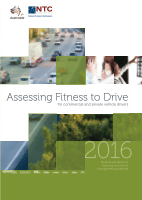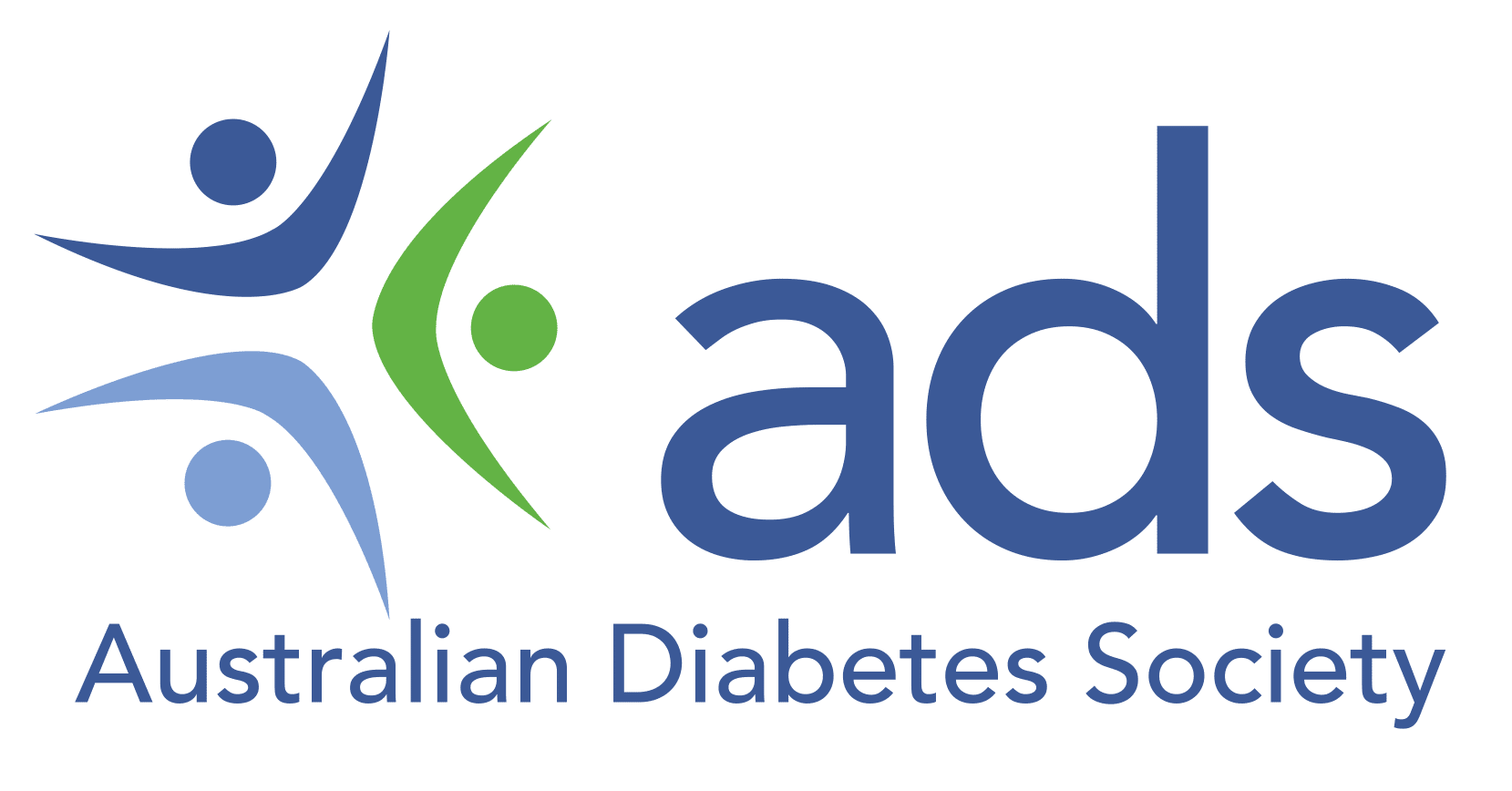November 2025: Launch of the National Diabetes Research Strategy 2026-2035
September 2025: Updated ADS MAFLD Living Clinical Guideline & Updated Australian Obesity Management Algorithm
August 2025: National Diabetes Research Strategy (2026-2035) & Updated Australian Obesity Management Algorithm
July 2025: Australian Strategy for Foot Health and Disease in Diabetes 2030
Updated clinical practice recommendations regarding the periprocedural use of GLP-1RAs and GLP-1/GIPRAs (April 2025)
Updated Management Algorithm & Treatment Website
Revised Australian Obesity Management Algorithm The Australian Diabetes Society (ADS) is proud to announce the release of an updated position statement for obesity management, The Australian Obesity Management Algorithm: A simple tool to guide the management of obesity in primary care. The paper has been accepted and published online by the journal of Obesity Research & Clinical Practice.The obesity management algorithm was updated in conjunction with the Australian & New Zealand Obesity Society (ANZOS), Australian & New Zealand Metabolic and Obesity Surgery Society (ANZMOSS) and Royal Australian College of General Practitioners (RACGP). New & Improved Treatment Website The ADS is also thrilled to announce the launch of a new treatment website in light of the release and publication of the updated obesity management algorithm – the type 2 diabetes (T2D) treatment website has recently been revamped to include obesity treatment too. The new treatment website features updated T2D case studies and an interactive obesity treatment algorithm designed to assist clinicians in treatment options for Australian adults living with obesity and its co-morbidities.
NOTE: the pre-existing T2D treatment website link remains functional and automatically redirects to the new treatment website if used.
T2D Treatment Plan
The blood glucose management algorithm for type 2 diabetes outlines the risks, benefits and costs of available therapies and provides an approach for how to incorporate older and newer agents.New treatment website features:
- Updated T2D Case Studies
- T2D Management Algorithm Diagram
- T2D Management Algorithm Position Statement
Obesity Treament Plan
The obesity management algorithm is a tool to assist clinicians in treatment options for Australian adults living with obesity and its co-morbidities.New treatment website features:
- Interactive Obesity Treatment Algorithm
- Obesity Management Algorithm Diagram
- Obesity Management Algorithm Position Statement
|
|
|
|
|
|
|
Notice of the ADS Annual General Meeting 2022
Notice is hereby given to members of the Australian Diabetes Society Limited to inform you that the 2022 Annual General Meeting (AGM) will be held in-person on Tuesday 9th August, 2022 from 2.30pm (AEST). The AGM will be held during the Australasian Diabetes Congress (ADC) at the Brisbane Convention & Exhibition Centre in Great Hall 1&2. Please note that there will be no option to attend the AGM virtually this year. Please advise the ADS Secretariat in writing via email to admin@diabetessociety.com.au at least 48 hours prior to the AGM, if you will be an apology. All financial members (Paid to 2022) of the society are welcome to attend the AGM. We look forward to seeing you there.Diabetes Health Professionals Election Campaign 2022
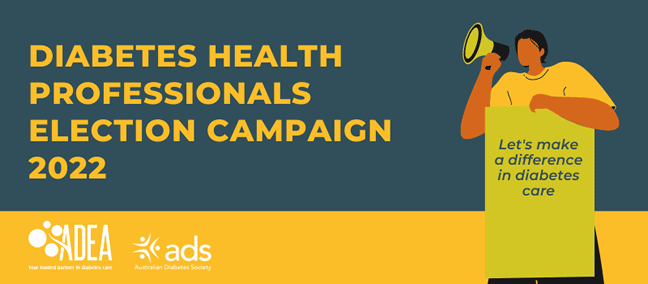
Let’s make a difference in diabetes care!
This election year, we want Parliament to make a real difference to the 1.4 million Australians living with diabetes and their carers.
In 2022, Parliament has the chance to drastically improve the lives of Australians living with diabetes, strengthen the health system, prevent and reduce disease burden and save money long-term by improving access to health care providers. In Australia, people living with diabetes shouldn’t lack access to expert diabetes care.
There are three small changes that health providers agree would have a tremendous impact:
1. Remuneration for diabetes health professionals to support optimal use of diabetes management technologies
Diabetes technology is lifesaving and improves the lives of thousands of Australians living with diabetes. However, learning how to use this technology can be challenging. Endocrinologists and Credentialled Diabetes Educators (CDEs) equip their patients and clients with the education and advice they need to manage diabetes technology.
To ensure their patients and clients receive the necessary care, they often work out of clinic hours and pro-bono, answering urgent calls or replying to text messages. In many cases, their intervention can prevent a late-night trip to the emergency department or even hospitalisation.
58,000 Australians are eligible to access crucial and often lifesaving diabetes technology through NDSS funding. Let’s ensure they understand how to use the technology optimally by supporting them with expert diabetes care. MBS funding for diabetes technology initiation and support will decrease inequity and increase access to the health system.
2. Additional CDE visits for the high-risk population to reduce the risk of complications
The National Diabetes Services Scheme (NDSS) annual cycle of care recommends that a person living with diabetes receive between four (for low-risk people) and up to 17 allied health visits a year to maintain optimum health, manage diabetes, and lower the risk of complications which include heart attacks, stroke kidney failure, blindness, and foot amputations. Five visits a year for allied health and five reserved for CDE visits for the high-risk population, at a GP’s discretion, will help people living with diabetes access the care they require to manage their condition well and may reduce the risk of complications.
3. CDE visits for people with gestational diabetes to prevent complications and lessen the risk of type 2 diabetes
Data demonstrate that people who develop gestational diabetes in pregnancy have a higher risk of developing type 2 diabetes, so do children born to parents who had gestational diabetes. Data demonstrate that half of all people with gestational diabetes will develop type 2 diabetes.[1] To reduce risk and provide continuity of care, all people diagnosed with gestational diabetes should be provided with MBS-reimbursed referrals to a visit a CDE:
- three visits during pregnancy, and
- two visits during the postpartum period.
This is in addition to the existing MBS referral to an Endocrinologist.
Be part of the election campaign: 3 ways you can help
Supporting materialsShare these materials with your Member of Parliament, Senator, and community: |
Get in touch with us (via ADEA)
For further information about the Diabetes Health Professionals Election Campaign 2022, please reach out to:
Melanie Gray Morris
ADEA Manager Policy, Advocacy & Communications
email: melanie.morris@adea.com.au
[1] Lowe, et al. (2018) Association of Gestational Diabetes with Glucose Metabolism and Childhood Adiposity. JAMA, 320(10): 1005-1016. doi:10.1001/jama.2018.11628.
Australian diabetes sector welcomes the release of new National Diabetes Strategy
Diabetes Australia has welcomed the release of the new Australian National Diabetes Strategy 2021-2030, announced this morning on World Diabetes Day by the Minister for Health and Aged Care, the Hon. Greg Hunt MP. Diabetes Australia CEO Professor Greg Johnson said the Strategy would help guide Australia’s response to the diabetes epidemic over the coming decade and he thanked Minister Hunt for his strong support for people affected by diabetes. “As a nation, we’ve been very pre-occupied with the impact and risks of COVID – meanwhile the serious impacts of the growing diabetes epidemic have continued,” Professor Johnson said. “Another 120,000 Australians have been diagnosed with diabetes in the past year and over 17,000 deaths in that time have been attributable to diabetes. “Diabetes is one of the most significant challenges currently facing Australia’s health system and the new National Diabetes Strategy 2021-2030 outlines the key areas including prevention, early detection, management and care that must be addressed more urgently in the coming decade. “There are currently over 1.4 million people living with known, diagnosed diabetes who are registered with the National Diabetes Services Scheme. In addition, there are an estimated 500,000 Australians with silent, undiagnosed type 2 diabetes and two million Australians with pre-diabetes who are at high risk of developing type 2 diabetes in the coming years. “Diabetes impacts almost every Australian family in some way, and we welcome the new Strategy to guide how the Commonwealth and State and Territory Governments jointly and individually respond to this serious threat to the health and wellbeing of the community. “In particular, we are pleased the new Strategy highlights key issues that require special attention including diabetes in aged care, prevention of type 2 diabetes, and diabetes in First Nations communities. “Aged care is an area of particular concern with estimates that 15-20% of all people in residential aged care facilities are living with diabetes. “Many of these older Australians have complex diabetes care needs and there are many failings in our current aged care system to address, in order to provide the specialised care these people need. “When it comes to prevention – we know type 2 diabetes can be prevented or delayed in up to 58% of cases and we urgently need a National Type 2 Diabetes Prevention Program with all the States and Territories and Commonwealth working together to reduce the number of Australians developing type 2 diabetes. “Diabetes is particularly devastating for First Nations Australians and communities and it is a major contributor to the gap in life expectancy between Indigenous and non-Indigenous Australians. “The gap is not closing and we hope the new Strategy will guide important steps and stronger action. “Diabetes Australia will shortly release its platform for the next Federal Election and we will be calling for commitments in many key areas identified in the new Strategy.” Australian Diabetes Society CEO Professor Sof Andrikopoulos said it was important that the new Strategy was backed up by significant investment. “The Strategy is an excellent roadmap but it needs to be supported by significant ongoing funding from the Commonwealth and State and Territory Governments to reduce the impact of diabetes,” Professor Andrikopoulos said. Australian Diabetes Educators Association CEO Susan Davidson applauded the Government and said Australia’s diabetes healthcare workforce looked forward to contributing to the implementation of the Strategy. “We are lucky in Australia that we have a passionate, skilled and committed diabetes healthcare workforce and this Strategy will help amplify their efforts to support people with diabetes,” Ms Davidson said. “It is particularly fitting that this new ten-year plan is announced on World Diabetes Day 14 November, which commemorates the birthday of Sir Frederick Banting, who was part of the team that discovered insulin. This year we are celebrating the 100th anniversary of the discovery of insulin and the millions of lives it has saved,” Professor Johnson said. “But there is still so much we don’t know about diabetes and its complications, and the new and better ways to prevent and manage the many different types of diabetes. There is a great need to increase funding for diabetes-related research in Australia.” Professor Johnson said Diabetes Australia was very pleased that there had been strong input to the new Australian National Diabetes Strategy 2021-2030 from an Expert Advisory Group, led by the Hon Judi Moylan AO and Professor Paul Zimmet AO, and he thanked all members of the Advisory Group for their contribution. You can read the Strategy here.World Diabetes Day; 14th November 2021
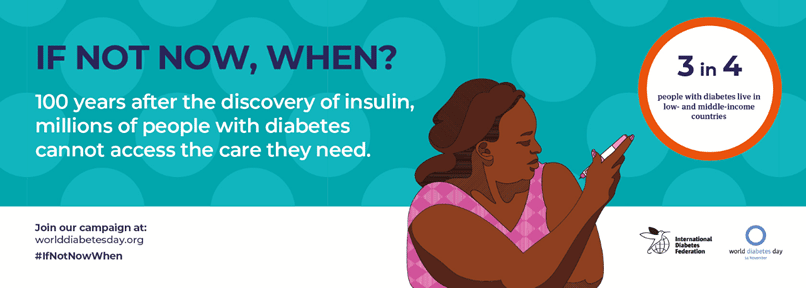
100 Years of Insulin: Innovation That Never Ends – Online Panel Discussion.


Live Panel Discussion Thursday 11 November 2021 | 7:00PM – 8:15PM
100 Years of Insulin: Innovation That Never Ends

Utilisation, access and recommendations regarding technologies for people living with type 1 diabetes: consensus statement of the ADS/ADEA/ADIPS/APEG Working Group
Authors: Anthony J Pease, Sofianos Andrikopoulos, Mary B Abraham, Maria E Craig, Brett Fenton, Jane Overland, Sarah price, David Simmons and Glynis P Ross
A consensus statement on ‘Utilisation, access and recommendations regarding technologies for people living with type 1 diabetes’ was jointly developed by a working group from representatives of the Australian Diabetes Society (ADS), the Australian Diabetes Educators Society (ADEA), the Australasian Paediatric Endocrine Group (APEG), and the Australasian Diabetes in Pregnancy Society (ADIPS) that reflects a national approach to provide best practice across the lifespan for all people living with type 1 diabetes, should have equitable access to the most effective diabetes management systems, including technology where clinically appropriate, regardless of age or concessional status. As diabetes management technologies continue to evolve, so too must management strategies and health care systems. The consensus recommendations should be read in conjunction with the Australian Living Evidence Guidelines in Diabetes.
The ADS/ADEA/APEG/ADIPS Consensus Statement on ‘Utilisation, access and recommendations regarding technologies for people living with type 1 diabetes’ can be viewed via the Medicial Journal of Australia (MJA) webpage at Utilisation, access and recommendations regarding technologies for people living with type 1 diabetes: consensus statement of the ADS/ADEA/APEG/ADIPS Working Group | The Medical Journal of Australia (mja.com.au) (Published online: 21 June, 2021). Download the consensus statement MJA summary – PDF (Posted: 21 June, 2021)
Please download the joint full version of the ADS/ADEA/APEG/ADIPS Consensus Statement on ‘Utilisation, access and recommendations regarding technologies for people living with type 1 diabetes’ – PDF (Posted: 21 June, 2021). Please visit the Australian Living Evidence Guidelines in Diabetes webpage at ADS- Living Evidence Guidelines in Diabetes
Potential Unification with Diabetes Australia: a national conversation
ADS has been a member organisation of Diabetes Australia since the 1980s along with the Australian Diabetes Educators Association (ADEA), Diabetes NSW & ACT, Diabetes Queensland, Diabetes Victoria, Diabetes Tasmania, and the Kellion Diabetes Foundation. Recently, some of these members (Diabetes QLD, Diabetes NSW/ACT) formally asked Diabetes Australia to consider unification with their members, if and when their members choose to unify. To enable this, Diabetes Australia ’s members voted unanimously to approve a proposed change to Diabetes Australia ’s constitution. The change also allows for other member organisations to consider unifying. Several member organisations are now having a conversation with their members about the possibility of unifying. ADS is actively participating in this national conversation with ADS members, the Australian Diabetes Educators Association and Diabetes Australia.
More information please download our FAQ. We ask ADS members to send any enquiries regarding the potential unification with Diabetes Australia to the ADS CEO; A/Professor Sof Andrikopoulos via email to ceo@diabetessociety.com.au
Diabetes Feet Australia (DFA)
We’re excited to share with you that Diabetic Foot Australia is now Diabetes Feet Australia!
As DFA has grown, our vision and objectives have remained consistent. But we also recognised the need to evolve our branding to better reflect who we are now, and what we represent as an organisation into the future. Since joining the Australian Diabetes Society (ADS) as a division in 2018, our goal has been to align with the ADS branding, whilst still retaining DFA’s most recognisable logo icons.
We may have changed our name, but our purpose to end avoidable amputations within a generation remains the same. You can read more about our re-brand at https://www.diabetesfeetaustralia.org/rebrand/

Webinars You May Have Missed
In our continuing effort to provide the latest education about diabetes, including clinical outcomes, we have created CONFERENCE CONNECT which provides access to live events from international symposiums, medical expert interviews and panel discussions covering highly anticipated study announcement and reviews on the latest research.



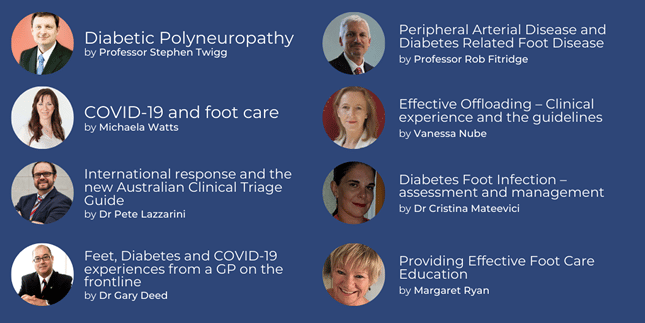
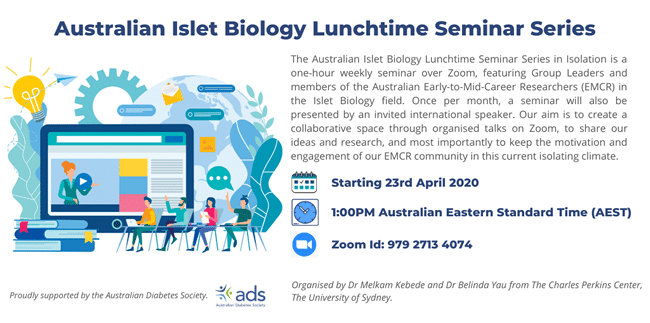

COVIDSafe Information
COVIDSafe App When you download the COVIDSafe app, you’re taking an important step to protect yourself, your friends and family against coronavirus, with your information and privacy strictly protected.
Learn more: https://www.health.gov.au/resources/apps-and-tools/covidsafe-app
Updates on Diabetes & COVID-19 from the Australian Diabetes Society
Please visit the ADS website page https://diabetessociety.com.au/covid-19-updates.asp for the latest information regarding Diabetes & COVID-19 for health professionals.
Coronavirus (COVID-19)
Please visit the Australian Government Department of Health website https://www.health.gov.au/ for the latest news and developments on the COVID-19 pandemic.
Coronavirus (COVID-19) infection control training
Please visit the Australian Government Department of Health website at https://www.health.gov.au/resources/apps-and-tools/covid-19-infection-control-training/ to register for the 30-minute online training module for health care workers in all settings. It covers the fundamentals of infection and control for COVID-19.
COVID-19 and the NDSS
Please visit the National Diabetes Services Scheme (NDSS) website at https://www.ndss.com.au/coronavirus-covid-19-information/ for the latest information for health professionals and consumers relating to NDSS products and diabetes medicines.
Important information for people with diabetes
Please visit the Diabetes Australia website at https://www.diabetesaustralia.com.au/coronavirus/ for the latest information for people with diabetes.
Managing Foot Disease in the COVID-19 Crisis
Please visit the Diabetic Foot Australia (DFA) website at https://www.diabetesfeetaustralia.org/dfd-and-covid19/ for further information and resources on diabetes related foot disease and COVID-19.
Coronavirus (COVID-19): Information on medicines and medical devices
Please visit the Therapeutics Goods Administration (TGA) website at https://www.tga.gov.au/behind-news/coronavirus-covid-19-information-medicines-and-medical-devices on information relating to COVID-19 and therapeutic goods in Australia.
Important changes to the National Diabetes Services Scheme efective as of 1 March 2020
Find out more about changes to NDSS products and services.
Continuous Glucose Monitoring Initiative: FreeStyle Libre added and eligibility criteria streamlined from 1 March 2020
Updated 24 February 2020
FreeStyle Libre flash glucose monitoring (Flash GM)
The Australian Government is including the FreeStyle Libre flash glucose monitoring (Flash GM) system on the list of products subsidised through the CGM Initiative as part of the NDSS. All products provided under the CGM Initiative will continue to be fully subsidised with no co-payment.
From 1 March 2020, FreeStyle Libre sensors will be available to all people who are eligible to access products through the CGM Initiative. This includes:
- Children and young people aged under 21 years with type 1 diabetes;
- Women with type 1 diabetes who are actively planning pregnancy, pregnant, or immediately post pregnancy;
- Children and young people under 21 years with conditions very similar to type 1 diabetes who require insulin; and
- People with type 1 diabetes, aged 21 years or older, who have a valid concessional status.
How do I activate the FreeStyle Libre sensor?
To activate the FreeStyle Libre sensor, participants in the CGM Initiative can either:
- download the FreeStyle LibreLink mobile app onto a compatible smartphone or smart device from freestylelibre.com.au/glucose-monitoring-system/librelink-app
OR
- order a free FreeStyle Libre Reader by calling the product manufacturer directly via the Abbott Diabetes Care Helpline on 1800 801 478, rather than through NDSS Access Points.
Updated Continuous and Flash Glucose Monitoring Eligibility Assessment forms will be available from 24 February 2020.
You will need to wait for the new application forms to submit your application for FreeStyle Libre.
Eligibility criteria streamlined
The Australian Government is streamlining the eligibility criteria to access subsidised products through the continuous glucose monitoring (CGM) Initiative.
From 1 March 2020, people aged 21 years or older with type 1 diabetes, with valid concessional status, will no longer need to demonstrate ‘high clinical need’ to access subsidised products from the CGM initiative.
Updated Continuous and Flash Glucose Monitoring Eligibility Assessment forms for people aged 21 years or older with type 1 diabetes, with valid concessional status, will be available from 24 February 2020.
You will need to wait for the new application form to submit an application for continuous flash and glucose monitoring under the streamlined eligibility criteria—starting 1 March 2020.
There are no other changes to eligibility criteria for other eligibility groups within the CGM Initiative.
Frequently asked questions
Do you have any questions about the changes to the CGM Initiative from 1 March 2020. Read our frequently asked questions here:
- Children and young people aged under 21 years with type 1 diabetes

- Women with type 1 diabetes who are actively planning pregnancy, pregnant, or immediately post pregnancy

- Children and young people under 21 years with conditions very similar to type 1 diabetes who require insulin

- People with type 1 diabetes, aged 21 years or older, who have a valid concessional status

Expanded access to Continuous Glucose Monitoring (CGM) subsidies from 1 March 2019 On 25 November 2018, the Minister for Health, the Hon Greg Hunt MP, announced that the Australian Government would commit more than $100 million in additional funding to expand the Continuous Glucose Monitoring (CGM) Initiative.
- children and young people with conditions very similar to type 1 diabetes, such as cystic fibrosis related diabetes and neonatal diabetes, who require insulin;
- women with type 1 diabetes who are actively planning pregnancy, pregnant, or immediately post-pregnancy; and
- people with type 1 diabetes aged 21 years or older who have concessional status, and have a high clinical need to access CGM products.
The Government also announced its intention to include the FreeStyle Libre flash glucose monitoring system on the list of products subsidised under the scheme, subject to price negotiations with the product sponsor.
As a result of the Government’s additional funding for this program, over 37,000 Australians will be eligible to receive fully subsidised CGM products. The detailed eligibility criteria for the expanded CGM Initiative, and application forms, are available via the National Diabetes Services Scheme NDSS website.Diabetc Foot Australia (DFA)
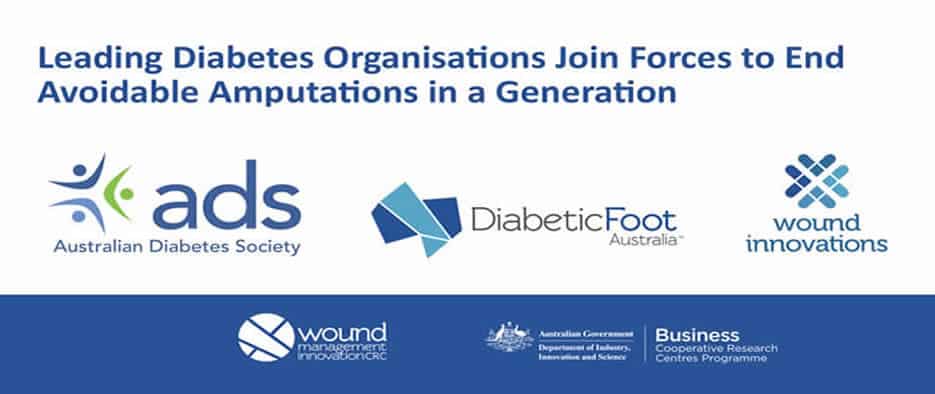
Diabetic Foot Australia is moving to the Australian Diabetes Society
We are delighted to announce that with the conclusion of the Wound Management Innovation Cooperative Research Centre (Wound CRC) this month, the Australian Diabetes Society (ADS) will take Diabetic Foot Australia (DFA) into its stable of national diabetes clinical and research programs from the 1st July 2018. Read Media Release (Posted 20 June 2018).
Launched by the Wound CRC in 2015, Diabetic Foot Australia has since become the national multi-disciplinary advocacy body for the prevention, care and research of this prevalant disease. We thank the Wound CRC for their vision, support and investment in establishing DFA and continuing in partnership with Wound Innovations as the Wound CRC’s successor.
DFA look forward to working with Dr Sof Andikopoulos and his expert team at ADS in accelerating DFA’s work and Australia’s progression to ending avoidable amputations in a generation. By combining the well-established reputation of ADS as the peak national diabetes body for scientific and medical sectors, with our engaged national diabetic foot community, we can drive further colloborations, research, education and most importantly, advocacy for patients.
For further exciting DFA activities to be released soon, please visit the DFA website at www.diabeticfootaustralia.org
Subsidised Continuous Glucose Monitoring for Young Australians
From 1 April 2017, the Australian Government will provide fully subsidised continuous glucose monitoring (CGM) products to eligible children and young people aged under 21 years with type 1 diabetes.
Children and young people who experience significant challenges in managing their blood glucose levels, particularly those who have difficulty identifying symptoms of hypoglycaemia, will benefit the most from CGM technology.
This initiative allows families and children to better self-manage their blood glucose levels, reducing visits to emergency departments and missed school days.
Continuous glucose monitors will alert users or their parents/carers if glucose levels are getting too low or too high without the need for continuous finger prick tests, reducing stress and anxiety for the child and young person and their family.
To be eligible, the child or young person will need to be assessed by an authorised health professional to determine if they meet specific criteria and to ensure that the use of CGM is a suitable part of their diabetes management plan.
The authorised health professionals for CGM assessment are endocrinologists, credentialled diabetes educators, and other health professionals specialising in diabetes (physicians, paediatricians or nurse practitioners).
An expert CGM Advisory Group, including endocrinologists, credentialed diabetes educators, consumer experts and other diabetes stakeholder groups, has advised that the best clinical outcomes are achieved when CGM is used as part of an ongoing diabetes management plan. Authorised health professionals will also play a key role in assisting in the set up and operation of CGM devices for eligible children and young people not currently using CGM.
The Continuous Glucose Monitoring Eligibility Assessment form is available at www.ndss.com.au/cgm.
Further information about access to CGM products through the NDSS, please visit www.health.gov.au/ndss-cgm. You can also call the NDSS Helpline on 1300 136 588. Download the CGM Flow Chart for Health Professionals – PDF
Australasian Diabetes Data Network (ADDN)
The Australasian Diabetes Data Network (ADDN) is an initiative of the Juvenile Diabetes Research Foundation (JDRF) supported by the Australasian Paediatric Endocrine Group (APEG) and the Australian Diabetes Society (ADS) to build long term clinical research capacity in Australia for people with diabetes. ADDN has established Australia’s first national clinical research diabetes database, collecting clinical information from people with type 1 diabetes and connecting the data on an integrated, secure, custom-built platform. This rich data resource includes national-level information about type 1 diabetes, available to researchers within strict ethical and governance boundaries. The database currently contains clinical data from children and adolescents with diabetes from seven specialist paediatric public tertiary centres across Australia. With planned expansion to adult centres, ADDN will extend its data capture and provide richer and more complete information about the natural history, clinical progression and most effective treatment regimens for all people living with type 1 diabetes. For more information, visit the ADDN website at http://www.addn.org.au/Enhancing Your Consulting Skills – available for download online
“Enhancing Your Consulting Skills: Supporting self-management and optimising mental health in people with type 1 diabetes” is designed for trainees in Adult Endocrinology, their supervisors and other interested health professionals. The resource includes topics such as information giving, health literacy, facilitating practical skills acquisition, and promoting behaviour change. It also explores the emotional, psychological and psychiatric issues that can impact on the quality of life of people with type 1 diabetes. “Enhancing Your Consulting Skills” was developed by the Australian Diabetes Society for the National Diabetes Services Scheme. It is now available in electronic format through the ADS website at: [http://diabetessociety.com.au/download-request.asp]. It can be downloaded free of charge for individual use. Please Note that you will be required to submit a request for download and obtain your password prior to receiving the download link. Hard copies of the resource are available from the ADS Secretariat.Important Information regarding changes to the National Diabetes Servcies Scheme (NDSS)
From 1 July 2016 some important changes are happening to the National Diabetes services Scheme (NDSS). There are no changes to the types of products available under the NDSS, but the way people access these products may change. People will still be able to access NDSS products through their local participating community pharmacy access point. In fact the Federal Government wants to extend the number of community pharmacies that provide NDSS products to make it more convenient for people with diabetes. NDSS products will no longer be available through Diabetes Australia (DA) or state and territory diabetes organisations. This means people will no longer be able to order products via the Diabetes Australia shops, the NDSS 1300 number or via the website. Diabetes Australia and state and territory diabetes organisations will instead focus efforts on continuing to provide education services for people with diabetes. There will be no changes to NDSS education services funded by the Government – in fact the Government will be increasing funding to expand education and support available to people with diabetes. Community Pharmacies have made up more than 90% of all NDSS access points in Australia for over ten years, so people can be confident that if they have not accessed pharmacy before for this, they will receive a high level of service. Please visit the Department of Health website for the latest updates or click here to read the NDSS Frequently Asked Questions.Australian National Diabetes Strategy 2016-20
The Australian Government has developed and released a new National Diabetes Strategy to update and priorities the national response to diabetes across all levels of government. The Australian National Diabetes Strategy 2016-2020 (the Strategy) is a high-level document that contains a number of goals and potential areas for action that provide a range of ideas for implementation to achieve each goal. This presents a range of opportunities for jurisdictions to partner with the Commonwealth to develop and support approaches for diabetes prevention and control. The Strategy was endorsed by the Australian Health Ministers Advisory Council (AHMAC) on 2 October 2015, noted by the COAG Health Council on 6 November 2015, and publically released 13 November 2015. An implementation plan will be developed in consultation with jurisdictions through AHMAC to consider the ways to direct funding and other resources and proposed measures to evaluate the progress of the Strategy. Engagement and support from jurisdictions will facilitate a coordinated approach to diabetes across governments and ensure there is broad benefit from the Strategy. The Strategy has been informed by the expert advice of the National Diabetes Strategy Advisory Group and consultations with key stakeholders and the community. The Australian Government provides support to people with diabetes through Medicare and a range of programs and this new Strategy will not replace or override existing processes. This Strategy aims to better coordinate health resources across the sector to where they are needed most. The Australian National Diabetes Strategy document is available from the Department of Health’s website at http://www.health.gov.au/internet/main/publishing.nsf/Content/nds-2016-2020 Media Release Statement by Health Minister; the Hon Sussan Ley MP on Australia delivers new National Diabetes Strategy on World Diabetes DayThe Australian Diabetes Society endorses Endocrinology, Diabetes & Metabolism Case Reports

